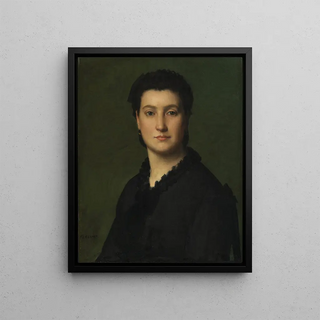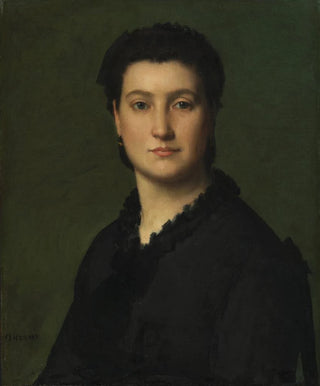Art print | Portrait of a woman (Case conflict) - Jean-Jacques Henner


View from behind

Frame (optional)
In the fascinating world of art, certain works stand out for their ability to capture the very essence of humanity. The "Portrait of a Woman (Case Conflict)" by Jean-Jacques Henner is a striking example. This canvas, created at the end of the 19th century, demonstrates technical mastery and emotional sensitivity that transcend time. Through the penetrating gaze of the depicted woman, the viewer is invited to delve into a world of reflection and questioning about the female condition. Light, color, and composition combine to create an atmosphere that is both intimate and universal, where every detail seems to tell a story.
Style and uniqueness of the work
Jean-Jacques Henner's style is characterized by a bold approach to portraiture, blending realism and impressionism. In "Portrait of a Woman (Case Conflict)", the artist plays with light and shadow, creating striking contrasts that highlight the delicate features of his model. The nuances of warm colors and touches of light on the skin give the female figure an almost palpable presence. Henner excels in capturing emotion, and this work is no exception. The woman's face, both serene and tinged with melancholy, evokes a psychological depth that challenges the viewer. The composition, meanwhile, is carefully crafted, with a blurred background that focuses attention on the main subject, while hinting at a broader world.
The artist and his influence
Jean-Jacques Henner, born in 1829 in Strasbourg, is an emblematic figure of the French artistic movement of the 19th century. Trained at the École des Beaux-Arts in Paris, he established himself as a master of portraiture and historical painting. His work is marked by a constant search for beauty and harmony, influenced by the great masters of the Renaissance and Baroque periods. Henner was also a pioneer in the use of color, anticipating some of the innovations that would mark the early 20th century. His impact on his contemporaries and on the

Matte finish

View from behind

Frame (optional)
In the fascinating world of art, certain works stand out for their ability to capture the very essence of humanity. The "Portrait of a Woman (Case Conflict)" by Jean-Jacques Henner is a striking example. This canvas, created at the end of the 19th century, demonstrates technical mastery and emotional sensitivity that transcend time. Through the penetrating gaze of the depicted woman, the viewer is invited to delve into a world of reflection and questioning about the female condition. Light, color, and composition combine to create an atmosphere that is both intimate and universal, where every detail seems to tell a story.
Style and uniqueness of the work
Jean-Jacques Henner's style is characterized by a bold approach to portraiture, blending realism and impressionism. In "Portrait of a Woman (Case Conflict)", the artist plays with light and shadow, creating striking contrasts that highlight the delicate features of his model. The nuances of warm colors and touches of light on the skin give the female figure an almost palpable presence. Henner excels in capturing emotion, and this work is no exception. The woman's face, both serene and tinged with melancholy, evokes a psychological depth that challenges the viewer. The composition, meanwhile, is carefully crafted, with a blurred background that focuses attention on the main subject, while hinting at a broader world.
The artist and his influence
Jean-Jacques Henner, born in 1829 in Strasbourg, is an emblematic figure of the French artistic movement of the 19th century. Trained at the École des Beaux-Arts in Paris, he established himself as a master of portraiture and historical painting. His work is marked by a constant search for beauty and harmony, influenced by the great masters of the Renaissance and Baroque periods. Henner was also a pioneer in the use of color, anticipating some of the innovations that would mark the early 20th century. His impact on his contemporaries and on the






